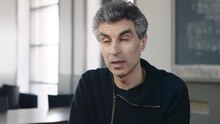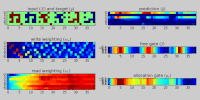Yoshua Bengio
Yoshua Bengio | |
|---|---|
 Yoshua Bengio in 2019 | |
| Born | March 5, 1964 Paris, France |
| Citizenship | Canada |
| Alma mater | McGill University |
| Known for | Deep learning, neural machine translation, generative adversarial networks, "attention model", word embeddings, denoising auto-encoders, neural language models, learning to learn |
| Awards | Marie-Victorin Prize (2017) Turing Award (2018) AAAI Fellow (2019) |
| Scientific career | |
| Fields | Computer science |
| Institutions | Université de Montréal |
| Thesis | Artificial Neural Networks and their Application to Sequence Recognition (1991) |
| Doctoral advisor | Renato de Mori |
| Notable students | Ian Goodfellow |
| Website | yoshuabengio.org |
Yoshua Bengio FRS OC FRSC (born March 5, 1964[1] in Paris, France) is a Canadian computer scientist, most noted for his work on artificial neural networks and deep learning.[2][3][4] He is a professor at the Department of Computer Science and Operations Research at the Université de Montréal and scientific director of the Montreal Institute for Learning Algorithms (MILA).
Bengio received the 2018 ACM A.M. Turing Award, together with Geoffrey Hinton and Yann LeCun, for their work in deep learning.[5] Bengio, Hinton, and LeCun, are sometimes referred to as the "Godfathers of AI" and "Godfathers of Deep Learning".[6][7][8][9][10][11]
Early life and education[]
Bengio was born in France to a Sephardic Jewish family who immigrated to France from Morocco, and then immigrated again to Canada. He received his BSc (electrical engineering), MEng (computer science) and PhD (computer science) from McGill University.[12]
Bengio is the brother of Samy Bengio, [13] who was a scientist at Google.[14]
The Bengio brothers lived in Morocco for a year during their father's military service in Morocco.[13] His father, Carlo Bengio, was a pharmacist who wrote theatre pieces and ran a Sephardic theatrical troupe in Montreal that played Judeo-Arabic pieces.[15][16] His mother, Célia Moreno, is also an artist who played in one of the major theatre scenes of Morocco that was run by Tayeb Seddiki in the 1970s.[17]
Career and research[]
After his PhD, Bengio was a postdoctoral fellow at MIT (supervised by Michael I. Jordan) and AT&T Bell Labs.[18] Bengio has been a faculty member at the Université de Montréal since 1993, heads the MILA (Montreal Institute for Learning Algorithms) and is co-director of the Learning in Machines & Brains project of the Canadian Institute for Advanced Research.[12][18]
Along with Geoffrey Hinton and Yann LeCun, Bengio is considered by Cade Metz as one of the three people most responsible for the advancement of deep learning during the 1990s and 2000s.[19] Among the computer scientists with an h-index of at least 100, Bengio is the one with the most recent citations per day, according to MILA.[20][21]
In October 2016, Bengio co-founded Element AI, a Montreal-based artificial intelligence incubator that turns AI research into real-world business applications.[19] Having failed to develop marketable products and losing several partnerships, by 2020 the company was running out of money and options and announced its sale to American software company ServiceNow in November. The sale will see largely Canadian taxpayer funded intellectual property exported to the United States, contrary to Bengio's desire to found Element AI as a Canadian company to rival the world's tech giants.[22] Bengio will stay employed as an advisor while the vast majority of employees were terminated with their stock options voided and cancelled with no value in lieu provided.[23]
In May 2017, Bengio announced that he was joining Montreal-based legal tech startup , as a strategy adviser.[24] Bengio currently serves as scientific and technical advisor for Recursion Pharmaceuticals[25] and scientific advisor for Valence Discovery.[26]
Awards and honours[]
In 2017, Bengio was named an Officer of the Order of Canada.[27] The same year, he was nominated Fellow of the Royal Society of Canada and received the Marie-Victorin Quebec Prize.[28][29] Together with Geoffrey Hinton and Yann LeCun, Bengio won the 2018 Turing Award.[5]
In 2020 he was elected a Fellow of the Royal Society. [30]
Publications[]
- Ian Goodfellow, Yoshua Bengio and Aaron Courville: Deep Learning (Adaptive Computation and Machine Learning), MIT Press, Cambridge (USA), 2016. ISBN 978-0262035613.
- Dzmitry Bahdanau; Kyunghyun Cho; Yoshua Bengio (2014). "Neural Machine Translation by Jointly Learning to Align and Translate". arXiv:1409.0473 [cs.CL].
- Léon Bottou, Patrick Haffner, Paul G. Howard, Patrice Simard, Yoshua Bengio, Yann LeCun: High Quality Document Image Compression with DjVu, In: Journal of Electronic Imaging, Band 7, 1998, S. 410–425 doi:10.1117/1.482609
- Bengio, Yoshua; Schuurmans, Dale; Lafferty, John; Williams, Chris K. I. and Culotta, Aron (eds.), Advances in Neural Information Processing Systems 22 (NIPS'22), December 7th–10th, 2009, Vancouver, BC, Neural Information Processing Systems (NIPS) Foundation, 2009
- Y. Bengio, Dong-Hyun Lee, Jorg Bornschein, Thomas Mesnard, Zhouhan Lin: Towards Biologically Plausible Deep Learning, arXiv.org, 2016
- Bengio contributed one chapter to Architects of Intelligence: The Truth About AI from the People Building it, Packt Publishing, 2018, ISBN 978-1-78-913151-2, by the American futurist Martin Ford.[31]
References[]
- ^ "Yoshua Bengio - A.M. Turing Award Laureate". amturing.acm.org. Retrieved December 15, 2020.
- ^ Knight, Will (July 9, 2015). "IBM Pushes Deep Learning with a Watson Upgrade". MIT Technology Review. Retrieved July 31, 2016.
- ^ LeCun, Yann; Bengio, Yoshua; Hinton, Geoffrey (2015). "Deep learning". Nature. 521 (7553): 436–444. Bibcode:2015Natur.521..436L. doi:10.1038/nature14539. PMID 26017442. S2CID 3074096.
- ^ Bergen, Mark; Wagner, Kurt (July 15, 2015). "Welcome to the AI Conspiracy: The 'Canadian Mafia' Behind Tech's Latest Craze". Recode. Retrieved July 31, 2016.
- ^ Jump up to: a b "Fathers of the Deep Learning Revolution Receive ACM A.M. Turing Award". Association for Computing Machinery. New York. March 27, 2019. Retrieved March 27, 2019.
- ^ "'Godfathers of AI' honored with Turing Award, the Nobel Prize of computing". March 27, 2019.
- ^ "Godfathers of AI Win This Year's Turing Award and $1 Million". March 29, 2019.
- ^ "Nobel prize of tech awarded to 'godfathers of AI'". The Telegraph. March 27, 2019.
- ^ "The 3 'Godfathers' of AI Have Won the Prestigious $1M Turing Prize".
- ^ "Deep learning godfathers Bengio, Hinton, and LeCun say the field can fix its flaws".
- ^ https://www.bloomberg.com/news/articles/2019-03-27/three-godfathers-of-deep-learning-selected-for-turing-award
- ^ Jump up to: a b "Yoshua Bengio". Profiles. Canadian Institute For Advanced Research. Retrieved July 31, 2016.
- ^ Jump up to: a b "Interview: The Bengio Brothers". Eye On AI. Retrieved February 24, 2021.
- ^ "Samy Bengio – Google Research". Google Research. Retrieved February 22, 2021.
- ^ Levy, Elias (May 8, 2019). "À la mémoire de Carlo Bengio". The Canadian Jewish News. Retrieved February 24, 2021.
- ^ Tahiri, Lalla Nouzha (July 2017). Le théâtre juif marocain : une mémoire en exil : remémoration, représentation et transmission (Thèse ou essai doctoral accepté thesis) (in French). Montréal (Québec, Canada): Université du Québec à Montréal.
- ^ "Célia Moréno, une marocaine au Québec". Mazagan24 - Portail d'El Jadida (in French). November 14, 2020. Retrieved February 24, 2021.
- ^ Jump up to: a b Bengio, Yoshua. "CV". Département d'informatique et de recherche opérationnelle. Université de Montréal. Retrieved July 31, 2016.
- ^ Jump up to: a b Metz, Cade (October 26, 2016). "AI Pioneer Yoshua Bengio Is Launching Element.AI, a Deep-Learning Incubator". WIRED. Retrieved September 7, 2018.
- ^ "Yoshua Bengio, the computer scientist with the most recent citations per day". MILA. September 1, 2018. Retrieved October 1, 2018.
- ^ "Computer science researchers with the highest rate of recent citations (Google Scholar) among those with the largest h-index". University of Montreal. September 6, 2018. Retrieved October 1, 2018.
- ^ "Element AI sold for $230-million as founders saw value mostly wiped out, document reveals". Retrieved December 19, 2020.
- ^ "Element AI hands out pink slips hours after announcement of sale to U.S.-based ServiceNow". Retrieved December 19, 2020.
- ^ "A Trump Dividend for Canada? Maybe in Its A.I. Industry". Retrieved October 11, 2018.
- ^ "Yoshua Bengio - Recursion Pharmaceuticals". Recursion Pharmaceuticals. Retrieved March 27, 2019.
- ^ "Yoshua Bengio Joins Valence Discovery as Scientific Advisor". Valence Discovery. Retrieved March 9, 2021.
- ^ "Order of Canada honorees desire a better country". The Globe and Mail. June 30, 2017.
- ^ "Royal Society of Canada". December 16, 2017.
- ^ "Prix du Quebec". December 16, 2017.
- ^ "Yoshua Bendigo". Royal Society. Retrieved September 19, 2020.
- ^ Falcon, William (November 30, 2018). "This Is The Future Of AI According To 23 World-Leading AI Experts". Forbes. Retrieved March 20, 2019.
External links[]
| Wikimedia Commons has media related to Yoshua Bengio. |
- Official website
- Yoshua Bengio publications indexed by Google Scholar

- 1964 births
- Living people
- Artificial intelligence researchers
- Artificial intelligence ethicists
- Canadian computer scientists
- Fellows of the Association for the Advancement of Artificial Intelligence
- French emigrants to Quebec
- French people of Moroccan-Jewish descent
- Canadian people of Moroccan-Jewish descent
- Sephardi Jews
- Mizrahi Jews
- Machine learning researchers
- McGill University Faculty of Engineering alumni
- Université de Montréal faculty
- Turing Award laureates
- Jewish Canadian scientists
- Fellows of the Royal Society

